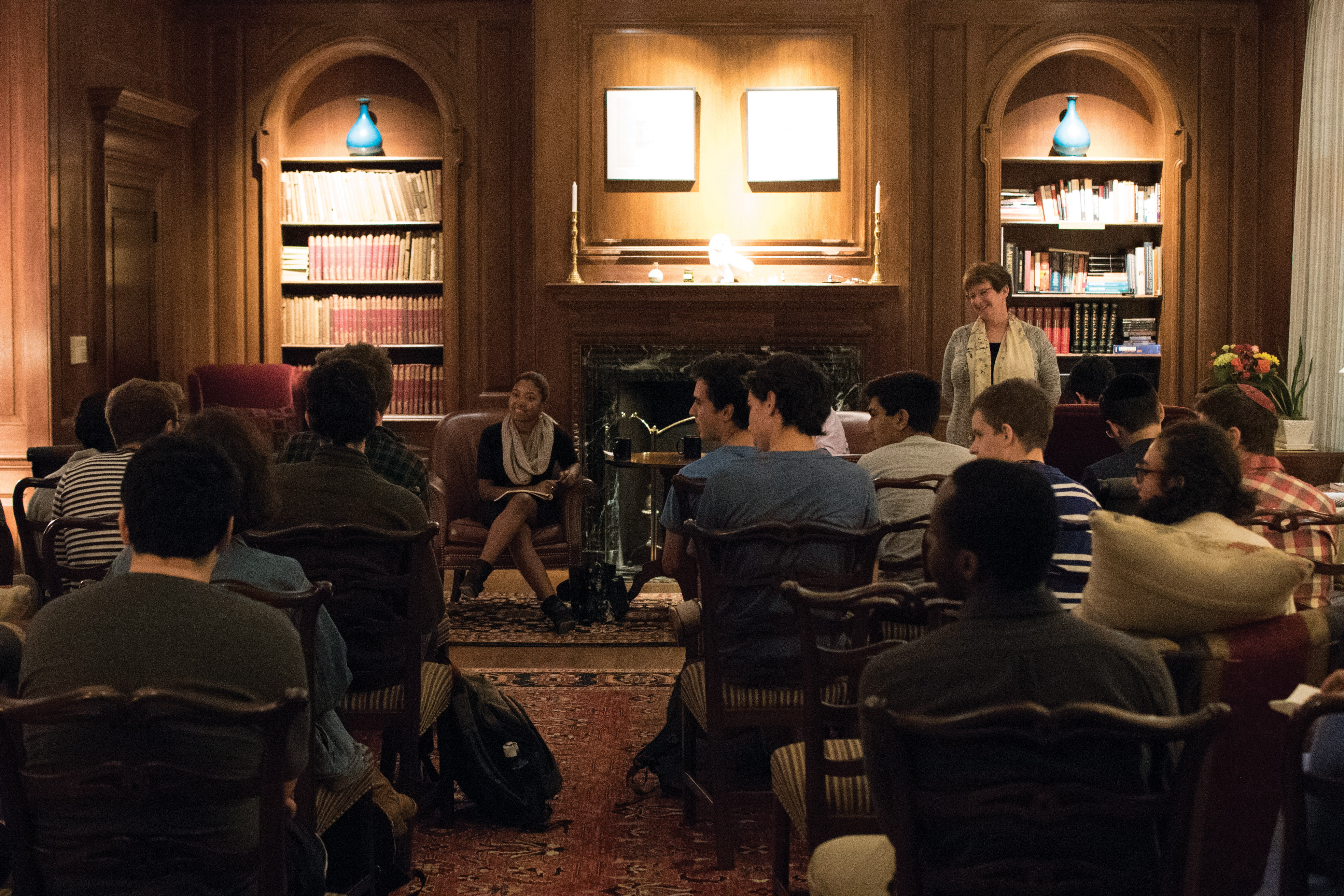
A crowd of around 25 Calhoun College students gathered in the College House Tuesday night to meet members of the University committee tasked in August with outlining the course of all future naming decisions at Yale.
At the hourlong event, Yale Law School professor John Witt, the chair of the Committee to Establish Principles on Renaming, responded to a range of student concerns -— from confusion over how Yale will enforce the renaming principles to frustration over a perceived failure to include undergraduates in the discussion.
The sole undergraduate on the committee, Dasia Moore ’18, joined Witt for the fourth discussion in the committee’s ongoing tour of all 12 residential colleges, which will continue into the next two weeks.
The naming committee was established Aug. 1 by University President Peter Salovey in the wake of widespread outrage over the decision to keep the name of Calhoun College. But at the meeting Tuesday, several students pointed out that Salovey’s August email did not explain how the committee will go about writing a report on renaming and how much oversight and authority the committee will have.
In particular, Calhoun students expressed concerns that the renaming discussions would further prolong a debate that many feel has already dragged on too long.
“We have had a whole year and more of this naming debate,” said Sarika Pandrangi ’17, former president of the Calhoun College Council. “For us, it’s a little tiring.”
Responding to Pandrangi, Witt said the committee will submit a report outlining principles for renaming to Salovey and the Yale Corporation by the end of the semester. Still, Witt added, the committee will have no enforcement power over future naming decisions. He said it remains unclear how long the University will take to fulfill Salovey’s promise to apply the committee’s report to the debate over Calhoun.
“That could conceivably be a very long process,” Witt said.
As the session continued, several Calhoun students raised concerns about other aspects of the committee, including how the personal views of the membership — made up of faculty, staff, alumni, one graduate student and one undergraduate — might affect the final report.
In response, Witt said he chose not to sign a petition last summer calling for Calhoun to be renamed because of concerns about “erasing history.” But, he continued, the job of the committee is to put aside those prejudices in service of the larger project.
“We’re trying to step back a bit from the specific debate on campus,” added Moore, who did not say whether she supports or opposes the name Calhoun.
Moore holds weekly office hours in Pierson College to discuss naming principles one on one with students, and Witt emphasized that her voice will hold as much weight in the final report as those of the faculty members who comprise much of the committee.
But after a year that left many students feeling betrayed by what they saw as the University’s slow and opaque decision-making process, the committee may face difficulty winning the trust of undergraduates.
Witt anticipated those concerns, emphasizing that undergraduate input is not mere “window dressing,” in what appeared to be a subtle allusion to the University’s long-unannounced 2013 decision to name one of the new colleges after Benjamin Franklin.
“We could have written the [principles] already, and then come here for window-dressing input,” he said.
Still, at the meeting, Calhoun freshman counselor Isaiah Genece ’17 said he fears the makeup of the new committee marginalizes undergraduate voices. This apparent disregard for undergraduates is all the more concerning given Yale College’s prominent role in driving the campus protests last year, Genece said.
Earlier this week, the timing of a midday panel discussion in the Law School hosted by the naming committee drew criticism from students who complained that the event conflicted with afternoon classes and took place in an inconvenient location for undergraduates.
According to Witt, none of the three previous discussions in Branford, Silliman and Jonathan Edwards Colleges attracted more than 10 students. In Calhoun, more than twice that number showed up.
In an interview with the News, Head of Calhoun College Julia Adams attributed that higher turnout to the intellectual vigor of an ongoing debate that has animated the Calhoun community for the last three semesters.
“We’ve talked a lot about this over the last one year plus,” Adams said. “And I think that showed up in the conversation tonight.”







